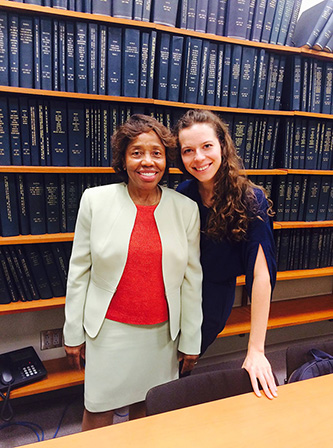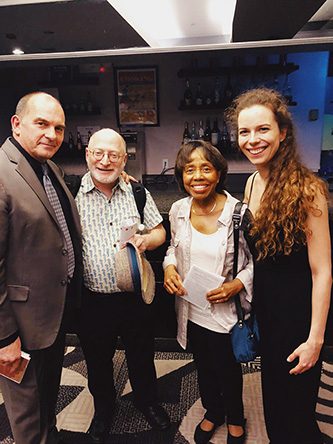American Music Review
Vol. LI, Issue 1, Fall 2021
By Polina Nazaykinskaya
When I think about how my journey as a composer began in my beloved home country of Russia, the distance in years and miles seems long. As I recall my career up to this point, it becomes increasingly clear that Tania León has played a pivotal role in the formation of my musical identity as a composer. But perhaps I need to give a little more background.
I first studied music as a violinist and flutist. I loved playing instruments and received encouragement from my teachers, as I was a good student who maintained long hours of practice and showed a good pace of development. Meanwhile, my career as a performer also progressed at a rapid pace, with victories at regional and national competitions, an orchestral job, and a continuous array of solo and chamber performances. Despite that period of initial success as a performer, I had discovered a powerful gravitation toward composition, which soon became nothing less than a calling in my life. The culture at the music schools in Russia is rich and remarkable, yet offers lackluster support for women in composition. As a student-composer, I felt isolated when I chose to forge a new path and withdraw from performance to concentrate full-time on composition, against the advice of my esteemed teachers.
My composition professor in Moscow, though a magnificent musician and skilled composer, did not believe composition could be a “woman’s career” and therefore often told me (in a jesting manner) to reconsider my focus on composition, opting for the “more normal life of a lady instrumentalist.” Essentially, he made clear to me that no matter how far I got I would not be taken seriously as a composer due to my gender. Fueled by my teacher’s disparaging comments and archaic disrespect, I made two unorthodox decisions: to leave the Conservatory, and then, to move to the United States to pursue my dream of being a professional composer.
It wasn’t until I arrived in New York and met Tania León that I understood the tremendous impact of a positive role model. When I first encountered Professor León, I was taken aback by her disarming warmth and her velvety voice which quickly put me at ease. Her luminous gaze exuded inner strength and a profound understanding that infused her presence with an air of regality to which I was immediately drawn. From the start of our meeting, I felt I had met an extraordinary person who would play a significant role in my life—and I was not mistaken.
I knew I needed a mentor who could demonstrate success in a breadth of genres as well as the ability to create significant contributions not only to music but also to theater and education; Professor León had composed, created, and influenced in all these areas. Being one of the founders and the first music director of The Dance Theatre of Harlem, Professor León has helped change the face of modern dance not only within the context of New York City but also in the international dance community. In addition, the value of music education was integrated into The Dance Theatre of Harlem’s DNA from the start with its incorporated music school and orchestra. Like the Alvin Ailey American Dance Theater before it, The Dance Theatre of Harlem puts Black dancers and other persons of color at the center of its creative nucleus, not only in the troupe itself but also in terms of the kinds of music commissioned and the narratives the organization chooses to tell.
Professor León’s ballets written for The Dance Theatre of Harlem – Haiku (1973), Dougla (with Geoffrey Holder, 1974), and Belé (with Geoffrey Holder, 1981) – represent invaluable contributions to the development of American modern dance as an art form in its own right. I was inspired by Professor León’s Dougla, which I saw at least four times performed live at the New York City Center. I distinctively remember a moment of awakening when I felt a definitive longing to write music for dance myself. In addition, I was mesmerized by Professor León’s power as a conductor and the majestic grace and vitality which she brought to every note. Serendipitously, opportunities to write for ballet would soon present themselves to me. One of the highlights of my career has been composing music for a ballet entitled Nostalghia, which was commissioned by RIOULT Dance and staged at the Joyce Theater in New York City in 2018. I sought Professor León’s guidance in navigating the ebb and flow of the creative process. Her support was instrumental at every stage, including in my performance as conductor of the chamber ensemble accompanying the ballet. Since 2018 I have been fortunate to write four more ballets: Vstrecha for Bolshoi Ballet in Moscow, Reverse Perspective for choreographer Jonah Bokaer, Encounters for MorDance, and The Rising for San Francisco Ballet.
I find myself drawn to the expressive manner with which Professor León is able to sculpt the soundscapes of our lives and integrate the roots of her cultural identity in original and invigorating ways. Her orchestrations represent a truly virtuoso understanding of acoustic sound and how the texture of a symphony orchestra can morph into a representation of the real-life soundscape. “The path of the composer” requires tremendous courage since a composer reveals their innermost soul to the world. Through music, we express ideas, feelings, and memories. We tell the world where we belong and for what we yearn. And in return, we ask to be heard. Therein lies the potential source of agony: we cannot predict the emotional level on which our musical expression will resonate with the audience. The way Professor León shares her inner world through her music is an inspiration for me to do the same.
Professor León’s journey as a composer began with writing for dance, and the essence of movement remains present in all her compositions. It’s interesting how our first steps as composers stay with us throughout the years. When she tells that story it sounds so natural, but it takes a courageous, spirited artist to delve into such an endeavor without years of experience and preparation. It was a natural evolution of Professor León’s talent from an accomplished pianist to a composer. Professor León speaks of how she would rearrange the pieces of piano repertory she was working on at the conservatory. Her teachers wouldn’t hear it, but she needed that creative outlet from early on. That was the composer in her, needing to create, even if it meant re-imagining music that was already there. I admire that quality in her immensely.
I believe that for both of us, the emigrant experience is part of our musical identity. Being away from a homeland gives us perspective, a certain distance from which we can crystallize the very thing we hold most dear about our countries. Professor León’s experience of growing up in Cuba with its diverse musical and cultural heritage creates a continuous leitmotif throughout her career, reincarnating in different genres, from dance to opera to chamber music works, such as Haiku, Drummin’ and the Pulitzer Prize-winning Stride.
For me, being away from Russia brings on a sense of nostalgia, which, in turn, becomes a very potent source of emotional inspiration. My connection to my heritage has only strengthened over the years since immigrating. I wonder if the absence of daily life minutia, which inadvertently comes with living in a place (any country, really) gives the artist an ability to synthesize the essence of their homeland, to capture its spirit, and translate it into art. For example, I am transported to Cuba when I hear Professor León’s work, even though I have not physically traveled there. Her music seems to embody the spirit of her ancestors, while always surprising listeners with an innovative approach to composition.
After working with Professor León, it became clear that performing music wasn’t enough to allow my inner voice to come out, to express my thoughts and experiences. I only felt musically at home while composing. I think she recognized me as a composer who needs to write music as a way of making sense of the world, my place in it, and my thoughts and feelings. And she always supported my emotional attachment to my Russian roots, allowing my particular style to evolve naturally, retaining a unified continuity of voice.
Under the mentorship of Professor León, I have taken on the challenge of becoming the conductor of a youth orchestra. In observing Professor León lead performances of her work, I take delight in how she infuses the musicians with her enormous charisma and vigor. Similarly, my early years of playing violin in the youth orchestra in Russia now provide invaluable resources as I step out onto the podium as the leader of such an orchestra. And I realize that all those years ago I didn’t cease performing; I just needed to take a step back, let the seeds of my life germinate, and find a way to return to that particular path.
It was also on Professor León’s advice that I began my career as an educator at Brooklyn College. Little did I know that the magical ritual of transferring knowledge (the miracle of amalgamation!) was to become an important aspect of my musical life. When I began to witness the processes of absorption, adaptation, and re-invention of the principles I teach my undergraduate students, the work Professor León and I have done together acquired additional meaning and added depth. I see with more clarity how gently yet specifically she has guided me along this path.
Perhaps the quality in Professor León that has influenced me and others the most is the way humanity and humility flow through her music and embrace her audience. In her latest symphonic work, Stride, the underlying meaning transcends musical form and elevates experience into the realm of collective communion with our humanity. I had the great privilege of being present at those now-historic performances with the New York Philharmonic celebrating women composers and the adoption of the 19th Amendment to the Constitution of the United States. What an immensely meaningful task it is to continue the work of women that came before us, in all spheres and industries; for our work is not yet done.
Music, with its power to move and speak across linguistic and cultural barriers, is therefore a tremendously potent medium in which Professor León’s important messages have been seen, heard, and felt. Following and expanding on her example of leadership and humanity, I hope to find the music within me to act on my passion for social equity in such a tangible, influential, and creative way. I carry the deepest gratitude to my remarkable mentor, Tania León, for standing by me and supporting me on this path to my dream: a life in music.








